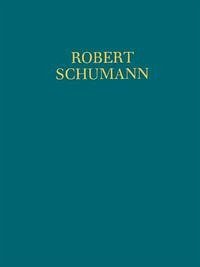As late as 1830, Robert Schumann described himself as ‘religious without religion’. Nevertheless, in 1852, he composed within four months not only Missa sacra but also his Requiem, a touching work which unfortunately is only seldom performed. It may well be that the external reason for their creation was the obligation, inherent in his new position in Düsseldorf, to write two church music pieces a year. But Schumann turned to the topic of religion internally as well. In a letter to August Strackerjahn from January 1851 he wrote: ‘To devote his powers to religious music probably remains the artist‘s ultimate goal.’ In this work, he combined the ‘sacred dignity of the old music with the rich ornamentation of the newer one’. As in Missa sacra, the free handling of the liturgical text is conspicuous Instrumentation: soloists, choir and orchestra op. 148
Noch 1830 beschrieb Robert Schumann sich selbst als „religiös ohne Religion“. Dennoch komponierte er 1852 innerhalb von vier Monaten nicht nur die Missa sacra, sondern auch sein Requiem, ein ergreifendes Werk, das viel zu selten aufgeführt wird. Es mag sein, dass die Verpflichtung zu zwei Kirchenmusiken im Jahr, die mit seiner neuen Stelle in Düsseldorf einherging, ein äußerer Anlass für die Komposition gewesen ist. Aber auch innerlich wandte sich Schumann dem Thema Religion zu. In einem Brief an August Strackerjahn im Januar 1851 schrieb er: „Der geistlichen Musik die Kraft zuzuwenden, bleibt ja wohl das höchste Ziel des Künstlers.“ Er verbindet in diesem Werk die „heilige Würde der alten Musik mit dem reichen Schmuck der neueren“. Wie in der Missa sacra fällt auch hier der freie Umgang mit dem liturgischen Text auf.
Noch 1830 beschrieb Robert Schumann sich selbst als „religiös ohne Religion“. Dennoch komponierte er 1852 innerhalb von vier Monaten nicht nur die Missa sacra, sondern auch sein Requiem, ein ergreifendes Werk, das viel zu selten aufgeführt wird. Es mag sein, dass die Verpflichtung zu zwei Kirchenmusiken im Jahr, die mit seiner neuen Stelle in Düsseldorf einherging, ein äußerer Anlass für die Komposition gewesen ist. Aber auch innerlich wandte sich Schumann dem Thema Religion zu. In einem Brief an August Strackerjahn im Januar 1851 schrieb er: „Der geistlichen Musik die Kraft zuzuwenden, bleibt ja wohl das höchste Ziel des Künstlers.“ Er verbindet in diesem Werk die „heilige Würde der alten Musik mit dem reichen Schmuck der neueren“. Wie in der Missa sacra fällt auch hier der freie Umgang mit dem liturgischen Text auf.

